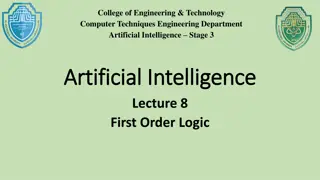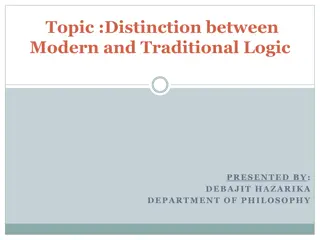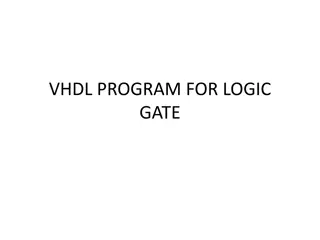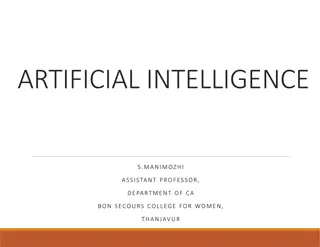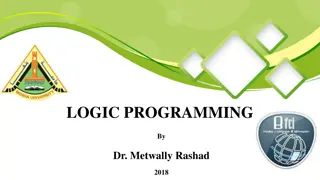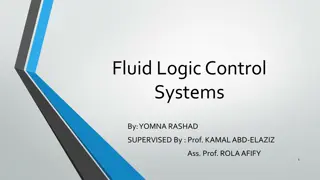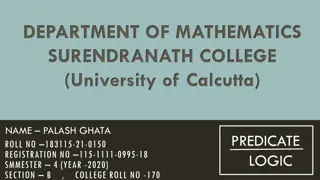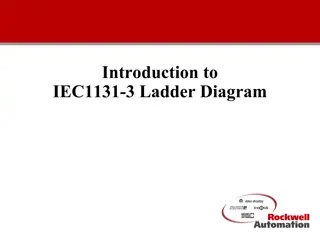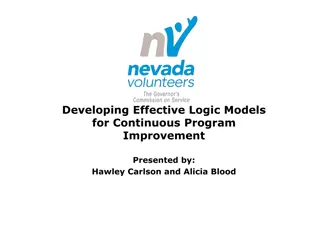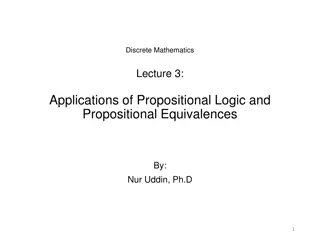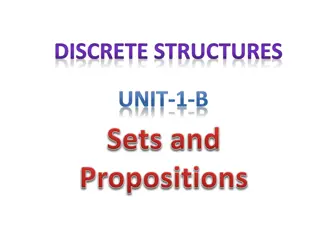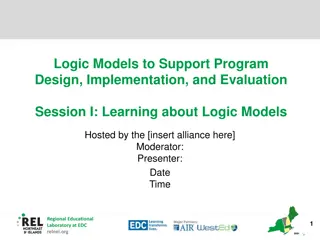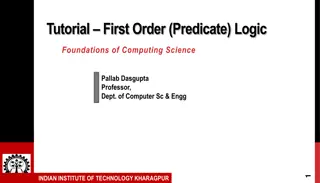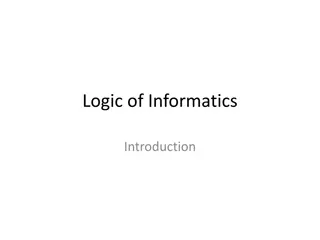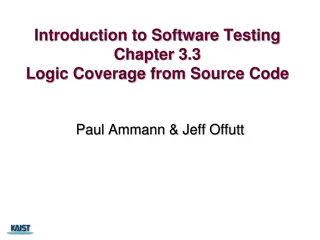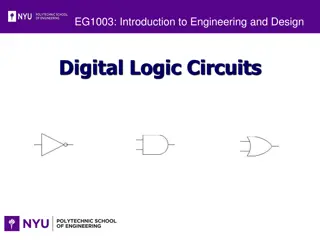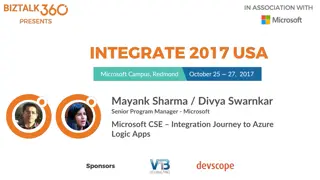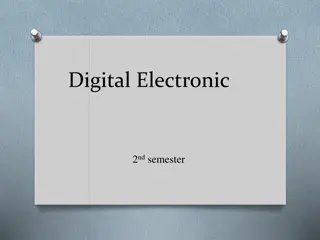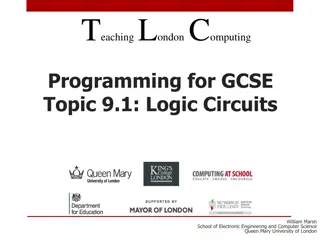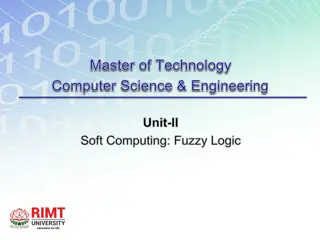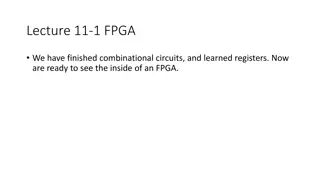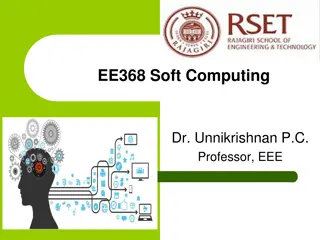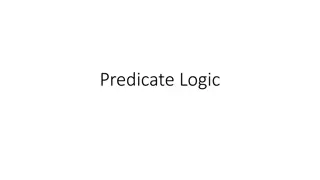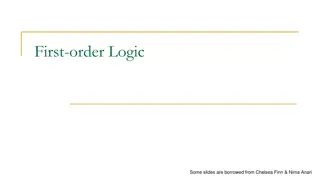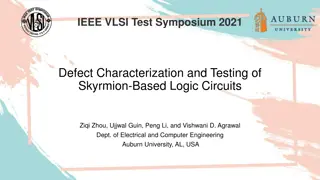First-Order Logic in Artificial Intelligence
Delve into the realm of first-order logic in artificial intelligence as a knowledge-based agent represents and deduces actions in its operating world. Explore the limitations of propositional logic and the expressive power of first-order logic, along with syntax, semantics, and models in logical lan
3 views • 27 slides
Topic : Distinction between Modern and Traditional Logic.
Logic, as a normative study, focuses on distinguishing correct reasoning from incorrect. Traditional logic, based on Aristotle's work, emphasized syllogistic reasoning, while modern logic, pioneered by figures like Leibnitz and Russell, employs mathematical methods and symbolic logic for a more adva
3 views • 10 slides
Logic Families
Logic families such as Diode Logic (DL), Resistor-Transistor Logic (RTL), and Diode-Transistor Logic (DTL) each have distinct capabilities and limitations when it comes to performing logic functions. While DL gates are simple and inexpensive but limited in functionality, RTL gates offer both normal
1 views • 22 slides
VHDL Logic Gate Programming Examples
This content provides VHDL code examples for various logic gates including AND, OR, NOT, XOR, and X-NOR gates along with their corresponding circuit diagrams. Each code snippet is accompanied by a brief explanation and a visual representation of the logic operation. The provided VHDL code can be uti
1 views • 7 slides
Predicate Logic in Artificial Intelligence
In the world of artificial intelligence, predicate logic plays a crucial role in representing simple facts. It involves syntax, semantics, and inference procedures to determine the truth value of statements. Real-world facts are represented using propositions in logic, allowing for structured knowle
1 views • 19 slides
Logic Programming and AI Principles
This course focuses on logic programming principles applied to AI problems. Topics include Prolog programming, backtracking, recursive rule definition, built-in predicates, lists manipulation, and advanced techniques. Declarative languages like Prolog differ from procedural languages by describing p
1 views • 26 slides
Introduction to Fluid Logic Control Systems
Fluid logic control systems utilize devices that switch fluid, like air, between outlets, providing ON/OFF outputs swiftly based on control signals. This article explores moving-part logic devices, control functions, Boolean algebra applications in control technology, and advantages of fluid logic s
1 views • 22 slides
Decision Analysis and Operations Research in Management
This content delves into Management Decision Analysis and Operations Research techniques such as Linear Programming, Integer Linear Programming, Dynamic Programming, Nonlinear Programming, and Network Programming. It covers the phases of an Operations Research study, mathematical modeling for decisi
0 views • 36 slides
Logic Circuits in Aircraft Systems
Aircraft logic systems follow MIL/ANSI standard logic symbols and conventions used in electronic applications. Inverters, buffers, AND gates, OR gates, NAND gates, NOR gates, Exclusive-OR gates, and Exclusive-NOR gates are commonly used in aircraft logic circuits. These gates have specific behaviors
0 views • 52 slides
Introduction to Predicate Logic in Mathematics
Predicate logic is a powerful tool used in mathematics to express complex relationships and assertions that cannot be adequately represented by propositional logic. It allows for the quantification of statements over a range of elements using predicates and quantifiers like universal and existential
2 views • 13 slides
Comprehensive Guide to IEC1131-3 Ladder Diagram Programming
The origins of ladder diagram programming trace back to the graphical representation of electrical control systems, evolving from relay logic to logic circuits and finally incorporating CPUs for control decisions. A ladder diagram consists of rungs containing input and output instructions, executing
0 views • 21 slides
Developing Effective Logic Models for Continuous Program Improvement
Explore the essentials of logic models and their significance in evaluating programs for continuous improvement, presented by Hawley Carlson and Alicia Blood. Learn about theory of change, logic model components, and using logic models for evaluation planning.
6 views • 12 slides
Applications and Equivalences in Propositional Logic
This lecture explores applications of propositional logic, including translating sentences, system specifications, logic puzzles, and logic circuits. It also defines tautology, contradiction, and contingency as types of compound propositions, along with logical equivalences. Examples and illustratio
0 views • 16 slides
Logic in Mathematics and Computer Science
Logic is a branch of mathematics that deals with true or false values. It is essential for fields like computer science, aiding in AI, automated reasoning, and digital logic design. Propositions, logical operations like conjunction and disjunction, and the use of propositional variables are fundamen
0 views • 28 slides
Propositional Logic and Mathematical Logic in Computer Science
Study the development of formal logic in computer science, focusing on propositional logic and mathematical logic. Learn about propositions, logical operators, and ways of combining statements to derive conclusions. Explore examples and understand how to determine the validity of arguments using log
0 views • 38 slides
Satisfiability Modulo Abstraction for Separation Logic with Linked Lists
This study explores the application of satisfiability modulo abstraction in separation logic with linked lists. It presents a technique using abstract interpretation concepts to handle separation logic formulas beyond previous methods, specifically focusing on over-approximating heaps that satisfy t
0 views • 41 slides
Binary Logic Systems in Documentation
Binary logic systems play a crucial role in documentation for individuals with diverse backgrounds such as management, process designers, operations staff, maintenance technicians, and more. These systems, depicted in binary logic diagrams, provide a clear and concise representation for various prof
6 views • 16 slides
Introduction to Symbolic Logic: Understanding Logical Inferences
Logic is the study of reasoning methods to distinguish between correct and incorrect arguments. Symbolic Logic involves representing logic symbolically for easier understanding and manipulation. Logical inferences help in making decisions based on reasoning chains. The content discusses the use of l
1 views • 28 slides
Logic Modeling for Effective Program Development
Explore the fundamentals of logic modeling through "Picturing Your Program: An Introduction to Logic Modeling" by Yvonne Watson from the U.S. Environmental Protection Agency. Discover the purpose, components, and benefits of logic models in program planning, design, communication, implementation, an
1 views • 36 slides
Logic Models for Program Design and Evaluation
Explore the concept of logic models as a valuable tool in program design, implementation, and evaluation. Learn about the elements of a logic model, its importance in clarifying program goals and outcomes, and how to construct one effectively for various initiatives. Dive into case examples and prac
0 views • 100 slides
UBU Performance Oversight Engagement Framework Overview
Providing an overview of the UBU Logic Model within the UBU Performance Oversight Engagement Framework, this session covers topics such as what a logic model is, best practice principles, getting started, components of the logic model, evidence & monitoring components, and next steps. The framework
1 views • 33 slides
Logic: An Introduction to Propositional Logic in Mathematics and Circuit Design
Logic plays a crucial role in mathematical reasoning, program design, and electronic circuitry. It is based on statements, known as propositions, that can be either true or false. A statement is a declarative sentence with a definitive truth value. Through examples, we explore the concept of stateme
0 views • 57 slides
Predicate Logic Problems and Solutions
Explore various scenarios and challenges in predicate logic, from converting statements to normal form to reasoning using predicate logic. Dive into encoding sentences in first-order logic, understanding FOL formulas, and formalizing sentences with FOL formulas.
2 views • 7 slides
Essential Principles of Teaching Programming Languages
Foundational concepts in programming form the core of computing. This encompasses understanding programming fundamentals, teaching language aspects effectively, statistical programming for data analysis, and guiding students unfamiliar with programming environments towards grasping the logic and sim
0 views • 23 slides
Computer Programming Principles
Dive into the world of computer programming, covering high-level and machine languages, compilers, interpreters, writing programs, top-down design, and the array of programming languages available. Understand the essentials of building code to control computers, the diversity of programming language
0 views • 23 slides
Evolution of Logic in Informatics and Computer Science
Explore the journey of logic from philosophical debates in ancient times to its crucial role in computer science today. From symbolic logic to mathematical foundations, discover how logic has shaped the development of formal systems and applications in various fields within the realm of informatics
0 views • 34 slides
Logic Coverage in Software Testing
Logic coverage in software testing involves deriving predicates from decision statements in programs. Programmers aim to keep predicates simple to ensure effective testing. Applying logic criteria to program source code can be challenging due to reachability and controllability issues. The provided
0 views • 14 slides
First-Order Logic: Models and Usage
Explore the fundamentals of First-Order Logic, including quantifiers, free and bound variables, nested quantifiers, connections between logic statements, and the concept of equality. Discover how to construct models for First-Order Logic sentences and grasp essential concepts such as scopes of quant
0 views • 21 slides
Digital Logic Circuits: A Comprehensive Overview
Delve into the world of digital logic circuits with a focus on logic gates, truth tables, Boolean equations, and Karnaugh Maps. Explore the concepts of AND, OR, NOT gates, along with practical applications such as ATM machine operations. Gain insights into designing combinational logic circuits and
0 views • 28 slides
Digital Logic Circuits and Design Principles
Explore the world of digital logic circuits with a focus on logic gates, truth tables, boolean equations, and Karnaugh maps. Learn how to design combinational logic circuits, analyze different logic functions, and solve sample problems related to digital logic. Get hands-on experience with LabVIEW a
2 views • 28 slides
Integration Landscape at Microsoft: Journey to Azure Logic Apps
Mayank Sharma and Divya Swarnkar, Senior Program Managers at Microsoft, discuss the current integration landscape at Microsoft, highlighting the transition to Azure Logic Apps. They emphasize the modernization of integration through metadata-driven flows and patterns for enhanced business agility an
0 views • 13 slides
Introduction to Digital Electronic Circuits and Logic Gates
Understanding digital electronic circuits and logic gates is essential for building digital systems. This content covers the basics of logic gates, digital signals, and the practical application of binary digits in circuits. It discusses the function and importance of logic gates, such as NOT gates
0 views • 17 slides
Logic Circuits in Computer Architecture
Explore the world of logic circuits through this comprehensive guide. Learn about logic gates, truth tables, and how computers are built from these components. Discover the basics of logic gates like AND, OR, and NOT, and delve into connecting gates to create functional circuits. Enhance your unders
0 views • 20 slides
Fuzzy Logic: Basics and Applications
Fuzzy logic deals with imprecise or ambiguous information, providing a way to represent and process data that is not clearly defined as true or false. This concept was introduced by Lofti A. Zadeh in 1965 through his research on Fuzzy Sets. Fuzzy logic allows for degrees of truth and provides a meth
0 views • 26 slides
Introduction to Logical Thinking: Science of Correct Reasoning
Logic, the science of correct reasoning, explores ways to infer conclusions from assumptions and validate arguments. This course introduces logic as a tool for analyzing arguments, automating processes, and enhancing communication clarity. Through classic logic variants like propositional and predic
0 views • 30 slides
The Inner Workings of FPGA and Complex Programming Logic Devices
Delve into the inner mechanisms of Field Programmable Gate Arrays (FPGA) and Complex Programming Logic Devices, examining components such as configurable logic blocks, lookup tables, function generators, multiplexers, and flip-flops. Explore the application of Shannon's Expansion Theorem in circuit
2 views • 10 slides
Applications of Fuzzy Logic in Soft Computing
Fuzzy logic is primarily used as the underlying logic system for decision support systems in various applications. From fuzzy controllers to fuzzy rule bases, this technology enables approximate reasoning similar to human decision-making processes. Explore the architecture and major components of Fu
2 views • 27 slides
Predicate Logic and Quantifiers
Predicate logic extends propositional logic by allowing statements to be assigned specific values. The limitations of propositional logic are overcome through predicate logic, where statements like "?. is greater than 3" have subject and predicate parts denoted as ?(?). Furthermore, predicates can b
1 views • 20 slides
First-Order Logic Fundamentals
Explore the limitations of propositional logic and delve into the syntax, semantics, and inference rules of first-order logic. Learn about predicates, quantification, and how to express relationships among objects using predicates. Enhance your understanding of how first-order logic provides a more
0 views • 42 slides
Defect Characterization and Testing of Skyrmion-Based Logic Circuits at IEEE VLSI Test Symposium 2021
With CMOS devices nearing quantum-mechanical limits, magnetic skyrmions offer a promising solution for next-generation spintronic logic devices and memories. This presentation at the IEEE VLSI Test Symposium 2021 delves into defect characterization and testing of skyrmion-based logic circuits. It co
0 views • 19 slides
